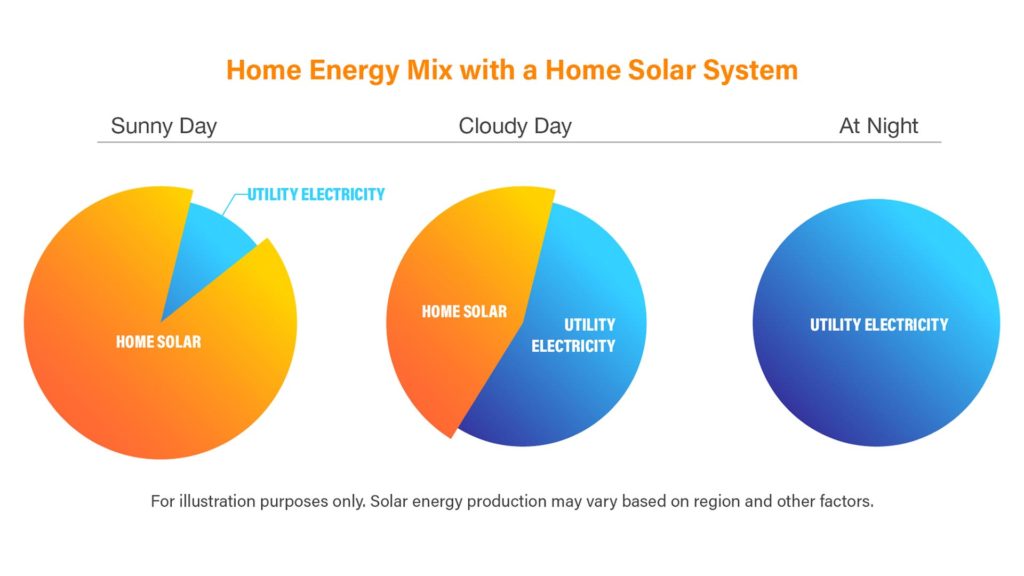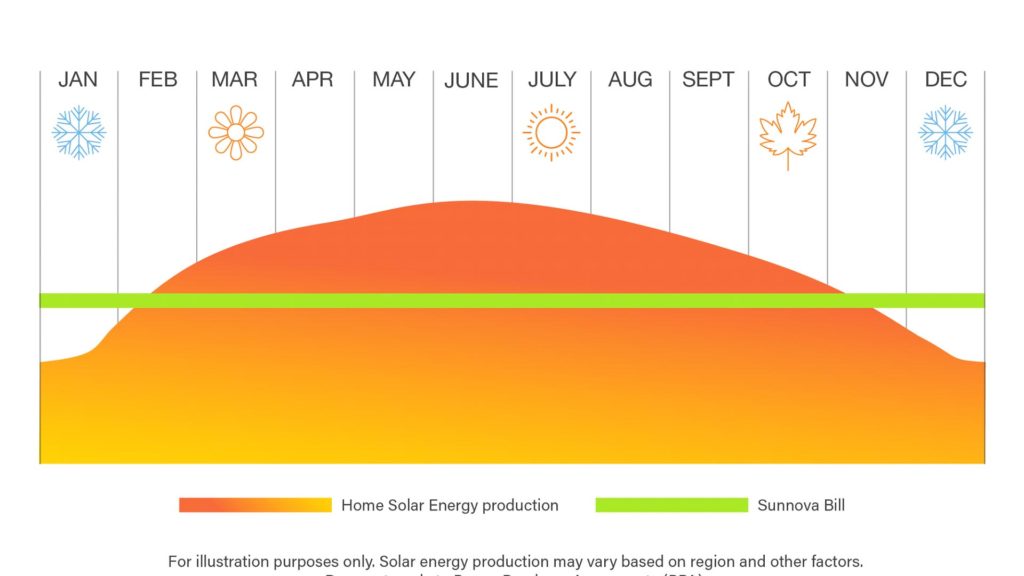There are many ways homeowners gain value from a home solar system: solar homeowners may enjoy the prospect of producing green energy, greater energy independence, and potential financial savings.
If you are a Zanbur customer, our warranty covers all system components for 25 years.1 A lot can happen in 25 years!
When assessing the financial value of your home solar system, it’s important to think about seasonality and home energy consumption changes throughout the entire lifespan of your home solar system.
Your Home Solar System May Help Offset Your Utility Electricity Needs
A major focus for homeowners considering solar is if a home solar system can offset their utility electricity needs and therefore reduce their utility bill. This is especially important for homeowners who live in markets with high utility rates.
If you’re a Zanbur customer, your home solar system will still be connected to your utility. During times when your home energy consumption exceeds your home solar production, you will use electricity from your utility.

The utility electricity offset by your home solar system will depend on your home solar system production and home energy usage at any given time.
Your Zanbur home solar system is designed based on your historical energy usage. In our solar energy plan proposal, we let you know how much utility electricity your home solar system will offset based on your current consumption.
How to Think About Seasonality and Your Home Solar System
The actual utility electricity offset by your home solar system will vary by weather, season, or your home energy consumption. This is because of the seasonality of solar production: your solar panels generally produce more energy during sunny seasons and less energy during cloudy seasons.
When you’re thinking about the financial value of your home solar system, we recommend reviewing an entire year or longer of home solar and utility bills.
Learn more about reading your home solar and utility bills here.
A home solar system may reduce your utility bill when combined with smart energy consumption. If you start consuming more energy at home because you have solar panels, then the energy offset by your home solar system will likely be minimal.
Home Solar in the Summer Vs. Winter
Across the United States, spring and summer are usually peak solar production times due to increased direct sunlight and longer days. However, in hotter states, higher production also corresponds to higher home energy consumption. Summer can mean high air conditioning and pool pump usage.
In addition, spring and summer may lead to increased plant growth around your solar panels. Zanbur recommends homeowners trim trees or shrubs that grow around your home solar system4 to prevent shading on the solar panels, which can lead to decreased home solar production.
While winter generally means decreased direct sunlight and shorter days, solar panels may still work well in winter. Solar systems can have increased efficiency in colder weather, and snow can wash away dirt on solar panels. However, in colder states, winter can increase home heater usage.

So, how do you think about seasonal changes in home solar production and energy consumption?
If you have net metering (also referred to as “Net Energy Metering” or “NEM”), excess summer solar production may help make up for increased use of utility electricity in the cold, dark winter.
Throughout the year, your home solar system will have high production days and low production days. Look at your home solar production over the course of each year.
If you’re a Zanbur customer with a production guarantee, we will ensure you’re compensated for any missed production guaranteed under your agreement.
Home Solar and Weather Changes
Daily changes may affect your home solar production in the weather.
During a rainstorm, your home solar system may be limited due to cloud coverage. If you live in an area with frequent rainstorms or hurricanes, you may want to consider adding a battery to your home solar system or installing a home solar system with a battery. A battery can provide backup power during an outage and can store excess solar production to use during times of low or no solar production.8
Snow will also impact home solar production, though not as much as you may think. Typically, wind can blow a small dusting of snow off solar panels. Even if heavy snow accumulates on solar panels, as soon as the snow starts to slide off and light hits the solar panels, solar production may occur. Once solar production starts, solar panels heat up, which can help snow melt faster.
What about the opposite of rain and snow? What if you live in a dry, arid climate?
If you live in a dusty climate, you may need to rinse your solar panels with water to clear the dust. Zanbur recommends homeowners spray their solar panels with a hose from the ground – do not get on your roof.4
Home Energy Usage
One part of home solar seasonality often overlooked has to do with the people in the home!
Throughout the year, you may be away from home on vacation, or you may have several guests staying at your home. It’s important to consider how adding more people to your household may affect your energy consumption. If you have multiple houseguests during low solar production times, you may receive an unexpectedly high utility bill. In contrast, if you’re on vacation during high solar production times, you may receive more net metering credits than normal (if your utility offers net metering).
Why Did I Receive a High Utility Bill?
If you’re a Zanbur customer, you will continue to receive a bill from your utility, even with a home solar system. More information about home solar billing is here.
If you receive a high utility bill, think about the seasonality of the past month. For example:
- Were there cloudier days than usual?
- Are there more people staying in your home than usual?
- Did my home energy usage increase?
If your home requires more electricity than in the past, the amount of your utility bill you offset will be affected, even if your home solar system is working perfectly.
A high utility bill or a period of lower solar power consumption does not necessarily mean that the financial value of your home solar system is reduced. The value of your home solar system should be measured over a year or longer to take into account all seasonal and everyday life changes.
Zanbur customers: if you are considering purchasing an electric car or upgrading your house in ways that will increase your energy consumption, please contact Zanbur to learn about your options for adding additional solar panels and battery storage.



